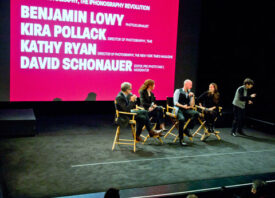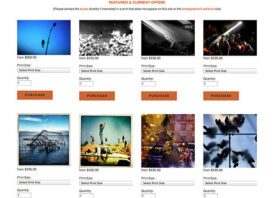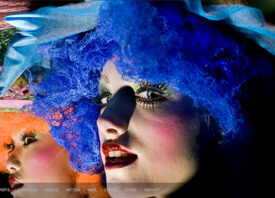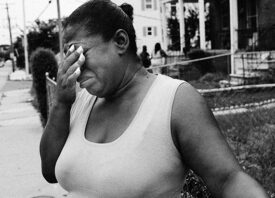Search this site
We Asked 16 Photographers: Are you Optimistic for the Future of Photography?
Benjamin Lowy: Of course I am. The future is innovation, and photography will change and adapt, but it will continue to be a viable artistic form. Whether one can make money from it is another question all together.
J.M. Giordano: We will always have still photography and it will always be important. This came to me while watching a doc on photography during the Vietnam War. There’s a 16mm film showing the execution of a Vietcong sympathizer by a cop. It happens very fast and the film was all but forgotten. Luckily, still photographer Eddie Adams was there to capture one of the most famous war photos of all time. No one remembers the film but EVERYONE remembers the still photograph. In reality, I’m more concerned with the future of GOOD photography. The more we accept mediocrity and fear criticism, the more we’re no longer able to judge what’s good and what’s bad. Everything isn’t awesome.”
Ron Haviv: I am very optimistic about the future of photography. While the monetization of our new world hasn’t reached the level we want, the audience level has. Never before has there been more interest in photography than now. Whilst almost everyone considers themselves a photographer of some sort, those same people are appreciating great photography in a new way. We at VII photo and other places have moved from content suppliers to actual publishers through social media and other venues. It is very exciting to be able to reach an audience the same size as a magazine.
Maggie Steber: I’m generally optimistic for photography. I think it has become more accessible and more democratic with the very tools that have also made it more challenging. If everyone has a camera or a smart phone, everyone is a photographer. If over 2 billion photos are made each day, largely because of smart phones, then everyone is a photographer. I love that idea. Where it becomes a problem is that not everyone understands what it takes to be a photographer and just how hard it is to be one nowadays, no matter who you are. Many people don’t realize there are rules for certain kinds of photography—journalism especially—that the photos cannot be set up and must be truthful, that captions must be complete and be truthful, the who, what, why, where, when, that photographs are historical documents and the supporting information is hugely critical. In addition, there are fewer venues, smaller budgets, and an overabundance of people wanting to be photographers, often without realizing just how demanding it is to be one. You could be the best photographer in the world, but if you don’t understand the business, how it works, how to talk to editors, not just subjects, and what magazines and newspapers need–if that’s the venue you want to reach—and finally how to get your work seen, it will be a struggle beyond doing.
But I also feel there are what I would call “broken promises” in terms of the internet taking the place of print. And I’m someone who has long worked with print publications and love them as my main venue. Part of the reason of the internet was to reach more people but also to save money and yet, it hasn’t paid off as predictions would have it. For example, many people don’t understand that for print publications, the cost of paper–to print on–alone rises constantly and is one of the largest expenses of any print publication. Add to that rising costs of insurance, travel, equipment that keeps one up to date, advertising revenue–EXTREMELY critical, has not met expectations… so the internet looked like the thing that was going to “save the world” when it fact, it changed it dramatically but not in a way that has proven itself to the fullest for the business side. The internet caused a shift in the paradigm for publishing in general but also how people receive information. It gives us more and we certainly have an abundance of photographs and photograpers because people have better access, but we all know it has changed it and it will not change back to what we now realize was more of a heyday.
My other lament is that so many young photographers simply do not know the history of photography and they are missing something wonderful. I’ve heard photographers presenting their work declare that they are the first ones to photograph this—-don’t bet on it, honey! That shows a lack of research and a great sense of hubris. It’s all been done! Having that background info, realizing you are building on something, finding a new way to tell the same old stories and ideas… this is what enriches the world. But if you take the business aspect out, I am overjoyed by the fact that so many people use photography to be expressive, to empower themselves, to record their lives. In that sense, photography is thriving.
Ed Thompson: I’m an under the radar photographer, even though I’ve had work in some very prominent publications (National Geographic Magazine, BBC, CNN etc) and interviews on the BBC and Al Jazeera, etc. Somehow I’ve managed to avoid the microcosm of the photo industry. I’ve seen photo festivals, trends, editors, experts, magazines and photographers come and go. I feel confident about the future and my involvement in photography in the same way a tumbleweed feels confident about being in a Western. I’m part of the landscape. Photography is Jack Torrance and I’m the Overlook Hotel.
Students know my work; I have dozens of emails every week from them and my website is very prominent in Google here in the U.K., so its cool to know my photography has had an influence on contemporary documentary photography. I’m known for being a highly ethical photographer and this is something I impart to my students – to question not only why they are making photographs but what the impacts of those images will be both socially and culturally once they are published. Hopefully the future of photography will be good, not just aesthetically, but morally.
Jasper White: We’re image makers, and there’s still a big demand, but I’m also aware that income streams are changing and all artists who work commercial are going to have to adapt to this ever changing landscape. How you do this, is to be seen; there’s no clear answer. But Yes .. I’m still optimistic.. life’s too short. Keep adapting, learning and enjoying.
Peter Dench: I’m very optimistic for the future of photography. These are very exciting and collaborative times. However, it’s no longer enough just to offer a client stills. Photography has to be part of a wider skill set: the ability to write, script, record audio, shoot video and have a wide social network to deliver to have all become crucial. I was recently assigned by WIRED to live stream video of an event using the Periscope app; was this photography? No, but it did require some photographic skills and was an equally engaging, frustration, rewarding and challenging experience – which certainly sounds like photography! Personally, I find long term photographic projects very necessary and satisfying, they are lasting and through the publication of books, a legacy.
Laura Pannack: I can’t predict the future, and I live in the present. I don’t worry or relax about it; I just embrace that I still have so much to learn and that’s not going to go away any time soon.
Michael Lavine: Photography is the baby of the family. If she can make it through the teen years, she should be fine.
Diana Markosian: I like not knowing. It opens things up. I guess I am less concerned about making work for the industry. I want to keep pushing myself to experiment. To grow. There is so much room to re-define photography. It’s a slow process, but that’s where the art really happens for me.
Cristina de Middel: Yes, of course. I think we are at the beginning of a new era in Photography after a very needed transition of the market where editorial is not leading us anymore. Young people are taking pictures every 2 seconds, and that is because a visual language is just born, so I am really curious to see where all this is going to take us. I really do not feel threatened by the democratization of photography. More the contrary… If there is more and more people understanding and communicating with images, that can only be good news. I guess as good as it was for Literature when massive alphabetization happened.
Jenny Lewis: Of course, I love that its no longer so elitist, that digital has opened up the medium to make it available to everyone. My first job was as a black and white printer, and I was incredibly reluctant to embrace digital and lose the romance of the darkroom, but the freedom to work on a tight budget that you get with digital is so liberating. I would never have had the money to work on a series for five years, shooting 150 people, if I would have had to have the money for film/ processing/ scanning costs and prints. All I needed was me and my camera, and with the internet, the series has now been seen around the world without the need of agents and extensive marketing, just people sharing with each other.
David Pace: I am optimistic. The digital revolution has given us incredible tools to make better images and has made it possible to share them with the rest of the world.
Molly Landreth: Absolutely! The medium of photography is changing faster than anyone could have ever anticipated and (even though I’m going to stick with my tripod and sheet film for a while). I’m so excited to see what the next generations of thoughful, mold-breaking photographers have in store for us.
Nancy Borowick: I am optimistic. Things are changing, and change is always scary, but I think there will always be cameras; there will always be a need for story telling, and there will always be people who want to tell those stories!
Martin Usborne: I am for photoboooks and for photography as fine art. Not for editorial, which is becoming swamped and undervalued.




